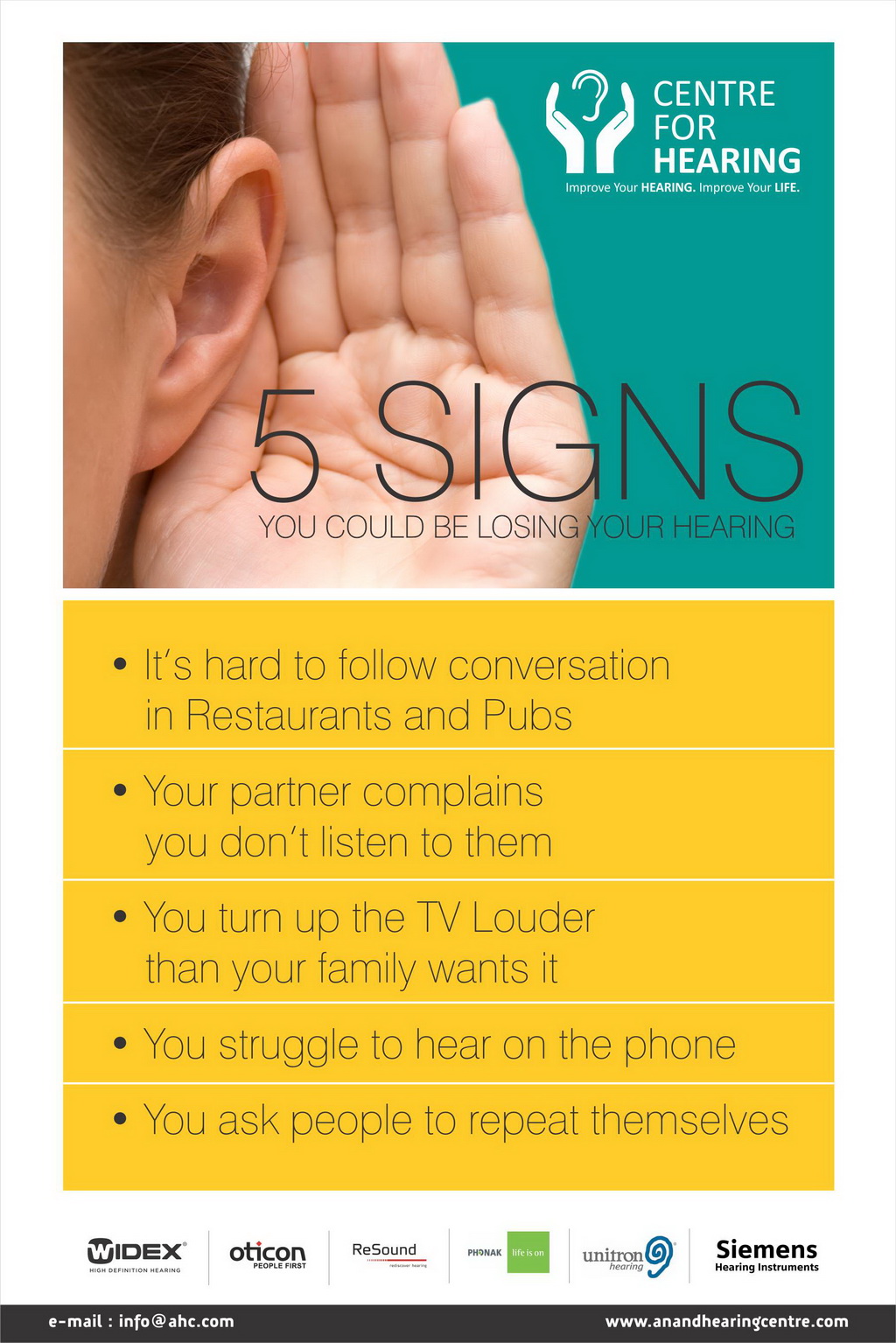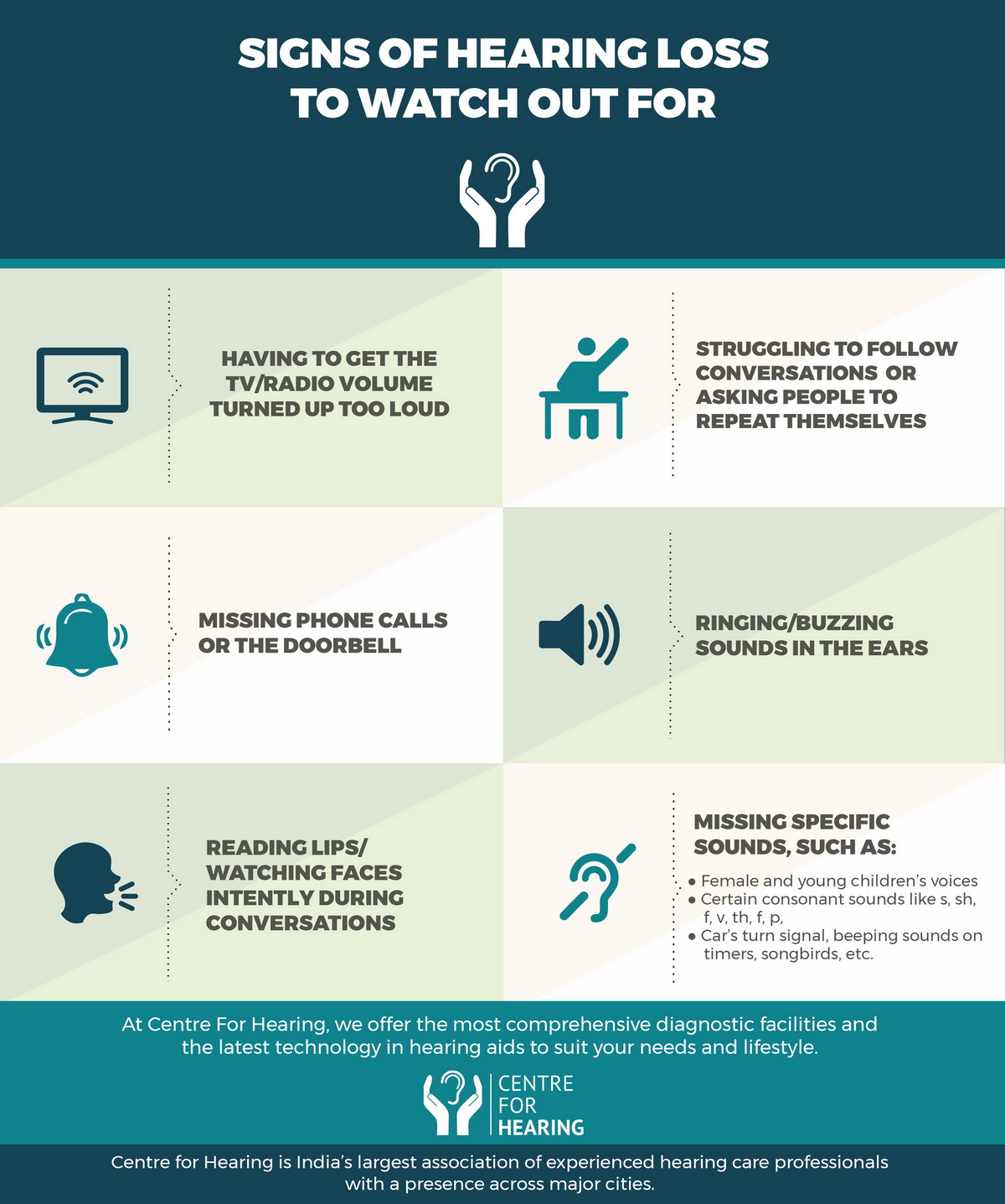Hearing loss is often considered a sign of ‘old’ age and perceived as a weakness. This social stigma attached to it makes the affected individuals reluctant to admit that there’s something amiss in their hearing. Identifying the signs of hearing loss can be all the more challenging when it comes to infants and children, especially in cases like congenital hearing loss.
In almost all cases of individuals suffering from hearing loss, friends and family are among the first few people to observe the changes in behaviour. Let’s take a look at some of the signs you can look out for to identify the onset of some form hearing loss in a loved one.

Signs Of Hearing Loss To Look Out For!
While there are different types and degrees of hearing loss, the signs remain more or less the same. For infants, from the time of birth until the age of around 24 months, paying attention to the various speech and hearing milestones can help to identify hearing loss. For adults and growing children, here are some of the signs typically seen in cases of hearing loss.
1. Having the TV/Radio turned up too loud:
The affected individual may constantly turn up the TV/radio volume, often without realising it could be too loud for everybody else in the house. This could be owing to him/her having trouble hearing background noises. Children might often sit too close to the TV to hear clearly.
2. Struggling to follow conversations/Asking people to repeat themselves:
One of the major signs of hearing loss is if the afflicted individual often asks others to repeat themselves during a conversation, or has trouble following the conversation. The individual will also complain about how people around him/her keep ‘mumbling’ or speak in ‘muffled tones’.
3. Missing phone calls or the doorbell:
The affected individual will complain about not being able to hear the doorbell and miss picking up phone calls. In fact, in cases where the individual knows there is something wrong with his/her hearing, he/she might deliberately avoid picking up calls to escape the embarrassment of not being able to hear clearly. Another sign is when the individual keeps switching between ears while conversing over the telephone.

4. Ringing/Buzzing sounds in the ears:
The affected individual might constantly complain of buzzing or whistling sounds in ears. Tinnitus results from the damage in the hair cells, and may often be a symptom of some other underlying problem.
5. Reading lips/Watching faces intently during conversations:
The affected individual will try to read lips during a conversation to gauge what a person is talking about. He/she will also focus intently on the person’s face while conversing with someone. In fact, one of the reasons why the hearing loss in children is often not diagnosed in time because they are experts at reading lips.
Additionally, children suffering from hearing loss may develop speech and language problems, and may also suffer academically. To know more about the signs of hearing loss in children, you may refer to this detailed guide on understanding hearing loss in children.
6. Missing Specific Sounds:
Individuals afflicted with a high-frequency hearing loss (similar to sensorineural hearing loss) will miss out on specific sounds like:
- Female and young children’s voices
- Certain consonant sounds like s, sh, f, v, th, f, p, making it difficult to understand some words
- The car’s turn signal
- Beeping sounds on timers and microwave ovens
- Songbirds

Stages of Accepting Hearing Loss – Realising the Problem:
As we have noted before, owing to the social stigma associated with hearing loss, affected individuals will rarely come forward with the problem. The process of acceptance alone often passes through various stages before trying to find a solution. Here are some of these ‘stages’ of hearing loss that a loved one may be going through.
- Denial: This stage of the ‘unwillingness’ to accept hearing loss might lead to a lot of friction between the affected individual and his/her family and friends.
- Fear And Withdrawal: The affected individual may stop attending social gatherings and avoid being part of conversations due to the fear of being ridiculed.
- Anger: The frustration of not being able to hear and communicate clearly might make the affected individual short-tempered. In fact, family and friends may also find it difficult to live with him/her.
- Depression: The isolation and loneliness resulting from the hearing loss may cause the individual to become depressed.
- Realisation And Action: With some support from family and friends, the affected individual might ultimately realize that hearing loss is a problem that simply needs a solution. This is the stage where the affected individual will try to seek help from an expert.
- Acceptance: Adjusting to the use of hearing aids or other hearing instruments takes time. Accepting that he/she has to live with hearing loss, is the first step towards a normal life.
Having identified the signs of hearing loss, the next step is to visit a certified audiologist for a confirmed diagnosis. The audiologist can identify the type and degree of hearing loss, and recommend a plan of action for treatment – either medical intervention or the use of hearing aids and such other hearing instruments.
If someone you know is exhibiting the above-mentioned signs, don’t waste time – get in touch with Centre For Hearing! We have comprehensive diagnostic facilities and a bevy of over 50 RCI certified audiologists to cater to the unique needs of your loved one!
Call us for FREE CONSULTATION on +91 9811227492!

Locate a Hearing Aids Centre Near You:
